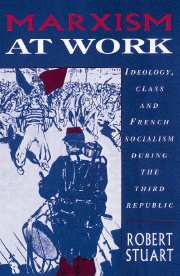Book contents
- Frontmatter
- Contents
- List of Illustrations
- Preface
- Part I In search of French Marxism
- 1 Ideology, history, and the study of Marxism
- 2 The Parti Ouvrier Français: its history and historiography
- 3 The axioms of class war: class, class consciousness, and class conflict
- Part II The making of the French working class
- Part III History and class conflict
- Conclusion
- Bibliographical note
- Index
3 - The axioms of class war: class, class consciousness, and class conflict
Published online by Cambridge University Press: 04 August 2010
- Frontmatter
- Contents
- List of Illustrations
- Preface
- Part I In search of French Marxism
- 1 Ideology, history, and the study of Marxism
- 2 The Parti Ouvrier Français: its history and historiography
- 3 The axioms of class war: class, class consciousness, and class conflict
- Part II The making of the French working class
- Part III History and class conflict
- Conclusion
- Bibliographical note
- Index
Summary
The history of all hitherto existing society is the history of class struggles.
K. Marx and F. Engels, The Communist Manifesto, in Collected Works (London, 1976), vol. 6, p. 482.We must convince the proletariat that every interest outside its class is an interest against its class.
E. Fortin, ‘La Question Militaire’, Le Socialiste, 21 January 1888.Students of socialist ideology have agreed that the concepts of ‘class’, ‘class conflict’, and ‘class consciousness’ pervade Marxist doctrine, and historians of the Parti Ouvrier have reinforced this consensus: all the history of French Marxism, at least, seems indeed to have been the history of class struggles. Anti-Marxists, however, have alleged that Marx and his followers rarely, if ever, defined these all-important terms, that Marxists have erected their vast conceptual edifice upon casually unplanned foundations. At first sight, this criticism devastates the Marxist tradition. Generations of social theorists have discovered, to their dismay, that Marx never devised detailed guidelines for the class analysis which articulated his system, and historians may search in vain through decades of Guesdist publications for explicit discussion of the role of class in the Parti Ouvrier's understanding of social order. Until the rise of ‘academic’ Marxism in the twentieth century, Marxists took ‘class’ for granted – its salience no more interrogated by socialists than was the primacy of the ‘individual’ by liberals.
Information
- Type
- Chapter
- Information
- Marxism at WorkIdeology, Class and French Socialism during the Third Republic, pp. 55 - 94Publisher: Cambridge University PressPrint publication year: 1992
